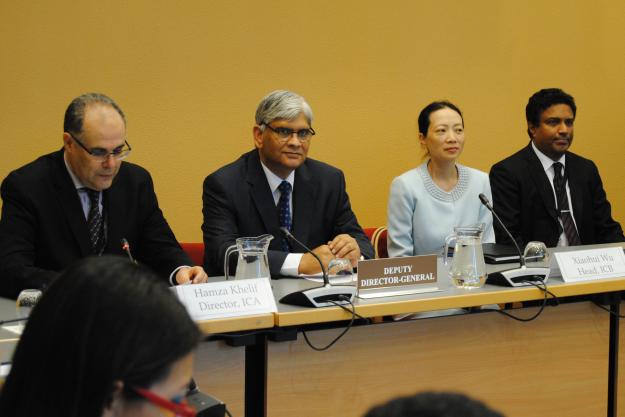
OPCW Deputy Director-General, Ambassador Hamid Ali Rao, at the launch of OPCW’s 19th annual Associate Programme.
THE HAGUE, the Netherlands —3 August 2018— The 19th annual Associate Programme was launched today at the Organisation for the Prohibition of Chemical Weapons (OPCW) Headquarters in The Hague.
In his opening remarks, OPCW Deputy Director-General, Ambassador Hamid Ali Rao, highlighted the programme’s capacity to enhance the knowledge and skills of the participants in safe and effective conduct in the chemical industry.
Ambassador Rao expressed hope that, “this edition of the Associate Programme will further contribute to strengthening our interaction with key stakeholders and reinforcing their role in successfully implementing the Chemical Weapons Convention”.
On the completion of the programme, the Deputy Director-General invited the participants to join the Alumni Network, and encouraged the transfer of the knowledge gained to enhance the economic and technological development of Member States. “Upon your return home, we hope that you will serve as valuable advocates and ambassadors for the implementation of the Convention, as well as for the promotion of the peaceful uses of chemistry,” he underlined.
In this year’s edition 31 participants from 31 OPCW Member States will attend the nine-week programme. The agenda combines lectures and exercises at the OPCW Headquarters in The Hague and at other chemistry and security institutions in the Netherlands.
The attendees will also travel to the University of Surrey in the United Kingdom and undertake a three-week Chemical Engineering Skills Development Course. They will afterwards undertake a three-week study at chemical facilities in 14 Member States in Europe, Asia and Latin America, learning how these modern facilities implement adequate safety and security measures.
The facilities taking part in the programme are located in Brazil, China, the Czech Republic, Denmark, Indonesia, Italy, Japan, Malaysia, Poland, Qatar, Saudi Arabia, Spain, Sri Lanka and Switzerland.
Associates participating in this year’s training represent the following countries: Afghanistan, Algeria, Armenia, Argentina, Bangladesh, Brazil, Burundi, China, Ethiopia, Georgia, Gambia, Iraq, Kenya, Malaysia, Malawi, Moldova, Mauritius, Nepal, Nigeria, Pakistan, Paraguay, Panama, Poland, Senegal, Sierra Leone, Saudi Arabia, Sri Lanka, Tunisia, Uzbekistan, Venezuela, and Zimbabwe.
Background
Since its inception in 2000, the OPCW Associate Programme has evolved into a major international training project, directly contributing to the economic and technological development of OPCW Member States, as stipulated in Article XI of the Chemical Weapons Convention. To date, 456 experts from 121 countries have participated in the programme.
The Associate Programme is made possible through continuing support from the OPCW Member States and partners, including representatives of chemical industry, academia and entities such as the World Customs Organization (WCO), European Chemical Industry Council (CEFIC), European Association of Chemical Distributors (FECC), European Chemicals Agency (ECHA), and Dutch Customs Authorities.
As the implementing body for the Chemical Weapons Convention, the OPCW, with its 193 Member States, oversees the global endeavour to permanently eliminate chemical weapons. Since the Convention’s entry into force in 1997, it is the most successful disarmament treaty eliminating an entire class of weapons of mass destruction.
Over 96 per cent of all chemical weapon stockpiles declared by possessor States have been destroyed under OPCW verification. For its extensive efforts in eliminating chemical weapons, the OPCW received the 2013 Nobel Prize for Peace.
